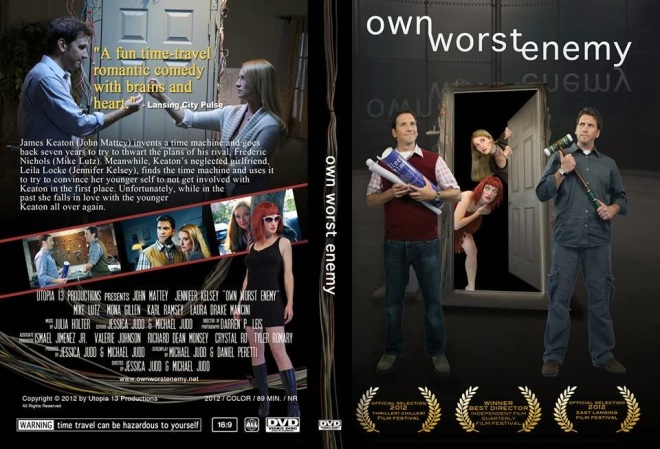I haven't had much success as a writer. A couple of short stories and
essays escaped into the world of publication, and a few academic
articles, mostly on mythology. One time I added up the amount of money I
have made from all that, and it came to something like four hundred
bucks (slightly more since I just got a royalty check from the folks who published my dissertation, of all things). The best thing I've written is probably a movie script called Own Worst Enemy, which I worked on with my college buddy Mike Judd. After we got a good draft done, Mike and his wife Jessica produced the film out in California. It turned out pretty good, I think.
I'm
thinking about it because of the story called
"All You Zombies," by Robert Heinlein, originally published in 1959. You can get a digital copy from Amazon for a few quarters. I guess it's somehow related to a recent movie called Predestination.
Now,
one reason I wanted to write a move about time travel was because I
didn't much like that kind of story. Wells's Time Machine wasn't very
interesting until the main character gets stuck way in the future.
Stanislaw Lem wrote some pretty good time travel stories, but I've never
felt compelled to go back to them. The problem I find with time travel
is that too many of the stories get stuck in making everything work out
nice and neat, a trap that even Heinlein falls into with "All You
Zombies."
However, because it's Heinlein we're talking about here,
"Zombies" ends on a pretty chilling and brilliant note. I like this
story a lot, despite my general antipathy toward time travel stories, and I
don't want to give a lot away here. It's a story worth reading with as
little foreknowledge as possible.
So when it came time to write my
own time travel story, I wanted to completely obliterate the idea of
the time travel paradox that fuels most of the stories. I didn't want
characters to have to leave the past the same, or to have to alter the
past to make things work out alright. Mike had suggested that we have
the inventor mess up his own life through the use of his invention. I
ran with that notion, in essence making the protagonists also the
antagonists. To me, the most interesting thing about time travel is the
chance to see your younger self and learn firsthand--not through
nostalgia or reminiscence--the various ways you've changed over the
years. I sent the characters back seven years into the past because I
remembered hearing the dubious fact that every seven years all the cells
in our bodies have been replaced. So if you go seven years into the
past you encounter yourself as an entirely different person, in terms of
biomass. I know that's got to be bunk, but it's also the stuff of
inspiration.
What I'm getting at is that there's good time travel stuff out there. I liked Heinlein's The Door into Summer, too. And there's Harlan Ellison's "City on the Edge of Forever," which was an episode of Star Trek, then a script in book form, and now a comic book. I like this one because it gets rid of the inevitability that plagues
many time travel stories, avoiding the idea that things have to work out
the way they have already worked out. And surprisingly, some recent Transformers comics (More than Meets the Eye volume 7) really knocked the idea out of the park. The best time travel stories make
their protagonists choose between equally difficult paths. There's
always another angle to take on the conventions of the genre--not just
deconstruction, either. I wouldn't consider Own Worst Enemy to be a deconstruction of the time travel story. It's just one of the many possibilities.


No comments:
Post a Comment
Note: Only a member of this blog may post a comment.